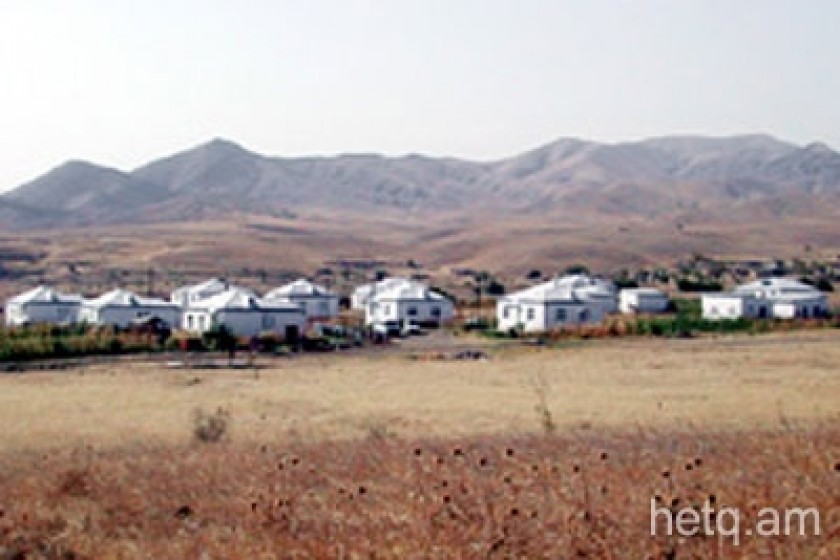
The Tufenkian Foundation in Artsakh
Aradjamugh, a new village in the Hadrut region, was built at the initiative of the Tufenkian Foundation. Settlers have now occupied eighteen houses in the village. Some are refugees from Azerbaijan, some have moved here from Armenia, and others are from various villages of Nagorno Karabakh whose houses were destroyed during the war. The newly built houses are comfortable, and have hot and cold running water.
Lyudmila and Martik and their five children rented a house in the village of Azokh. A year ago they were provided with a new house in Aradjamugh. Martik came home one day with the keys and said, “Pack up, we're moving.” Lyudmila Harutyunyan is a refugee from Baku, where her family lost everything.
“We were still kids; I was an eight-grader when we left our home. The Karabakh movement began and we went to Stepanakert. We left everything behind; we took some clothes and left. We didn't even turn the lights off, to make it look like we were still there,” Lyudmila recalled.
Now Lyudmila has a home of her own and she says she thanks her lucky stars. Her husband is a construction worker and she and the children tend their vegetable garden.
“We grow whatever we can – tomatoes, cucumbers, peppers, beans, melons and water-melons. It's enough for us,” Lyudmila said.
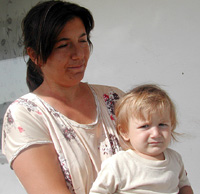 |
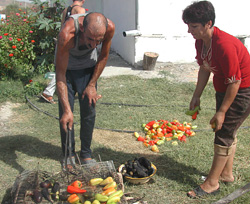 |
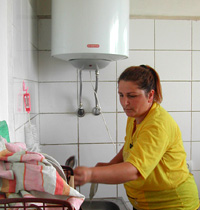 |
The residents of Aradjamugh have plots of land adjacent to their houses. Almost everyone has planted us flowers in front of their houses and their houses look like little oases from a distance. Nazik's house was bustling – the neighbors had gotten together to put up preserves for the winter. Without stopping her work, Nazik told me how she ended up in Aradjamugh. She had worked as a cook in the Hadrut military unit.
“I came from Ararat; my family has been here for eight years now. At last we got a house. We have four children. Two of them are married; the other two live with us. I work, take care of my land, my home. I'm very happy. I like this area a lot,” Nazik Antonyan says.
 Andranik Ohanyan and his wife Anush moved here from Yerevan. Their son Aram was born in Hadrut. Andranik even built a small fountain in their backyard.
Andranik Ohanyan and his wife Anush moved here from Yerevan. Their son Aram was born in Hadrut. Andranik even built a small fountain in their backyard.
“We have water permanently; we have an Ariston water heater supplying us with hot water. We have a land and we're cultivating land for the first time – we're city people. Thank God! We're doing well, cultivating our vegetable garden. We grow tomatoes, cucumbers, eggplants, peppers; the irrigation water supply is fine; the harvest is good. There is a lot of fruit everywhere you look – pomegranates, figs, cornels, if nothing else we can make preserves, jams and have it with bread.
Everyone in Aradjamugh invites us to taste the gifts of their gardens. At the Ohanyans, the mistress of the house proudly serves us watermelon grown in their garden.
The Tufenkian Foundation is planning to build a school and a kindergarten in Aradjamugh, and in order to provide the villagers with jobs it will restore fifty hectares of vineyards next year.
The oasis of Kashatagh
The foundation has already revived thirty-five hectares of abandoned grape vineyards in the villages of Urekan and Aygehovit in Kashatagh. This year the villagers have gathered the first harvest.
Edik Grigoryan the Tufenkian Foundation's vineyard project manager, told us about the project, the only one of its kind in Karabakh. The project has already yielded results and could serve as a model for all those organizations wishing to work in Karabakh.
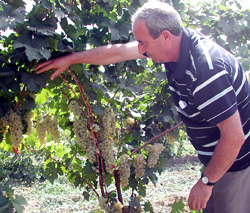 |
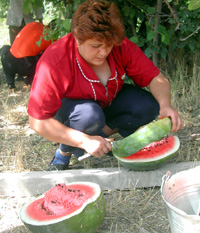 |
“The Tufenkian Foundation has taken care of all of the expenses for reviving the vineyards, and the workers are mainly local people, members of the community. They are involved in the project with the understanding that once the vineyards are restored, the money will be repaid and the vineyards will be managed by the community. The villagers don't have the financial means and the restoration of the vineyards requires a lot of money – it's not only the restoration, they need to treat them, the chemicals are expensive, and the villagers are unable to take care of all this. According to contracts signed, the Foundation covers the expenses for the restoration and once they are paid back, the vineyards will be given to the community members,” Grigoryan explained.
The villagers who work at the vineyards are paid salaries according to their work. The average monthly salary is 25,000-30,000 drams (about $65 –75). This year the vineyards yielded 12 tons of grapes and in 2008, according to Edik Grigoryan, the harvest will reach 400 tons.
The grapes are transported to and processed at the Hadrut Winery 70 kilometers away. To avoid additional expenses and to create new jobs, the Tufenkian Foundation is planning to build a facility for the initial processing of the grapes in this area.
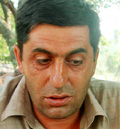 “170 people live in Urekan. There were five births registered this year,” said Garik Matevosyan, head of the village administration, proudly. Thirty-five people have permanent jobs at the vineyards.
“170 people live in Urekan. There were five births registered this year,” said Garik Matevosyan, head of the village administration, proudly. Thirty-five people have permanent jobs at the vineyards.
Urekan was resettled in 1995. Garik Matevosyan, who was elected in 2004, was awarded the Military Cross. He is also the military training instructor at the local school, which has 20 pupils. “Karabakh legislation doesn't permit signing contracts with villagers, since the land here has not been privatized. They should give this land to people to make them more attached to these territories,” the local mayor said.
The vineyards are irrigated with water provided by the Tufenkian foundation.
“It will be fine here, I'm confident of that. The only problem is that the children have nothing to occupy themselves with. We have such big harvests here – figs, pomegranates… People come here, buy a bucket of figs for 2,000 drams and then sell it for 7,000 drams. If there were a cannery here people would bring their harvests here for processing. The same holds true for dairy products; the cows here produce up to 20 liters of milk a day,” the 32-years-old mayor explained.
He keeps a record of all vineyard expenses throughout the year; at the end of the year he will present it to the local community to deduct the expenses from the profits.
“This project is a patriotic one,” Matevosyan said. “The Tufenkian Foundation doesn't make any profit. It's all done for the settlers.”
 Videos
Videos Photos
Photos




Write a comment